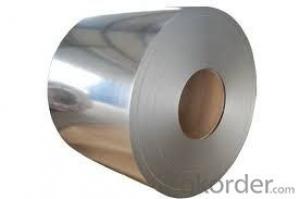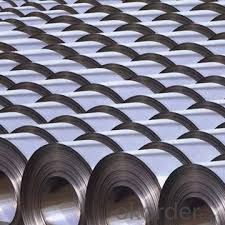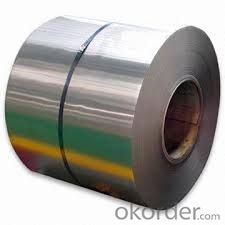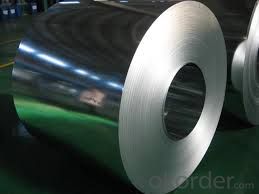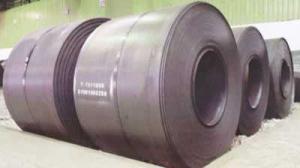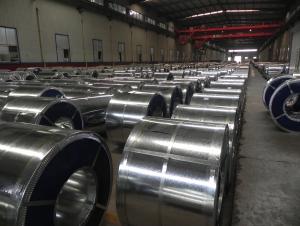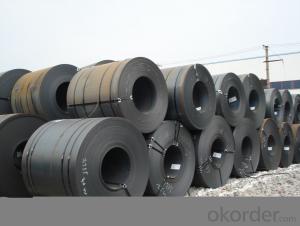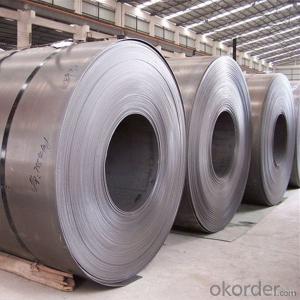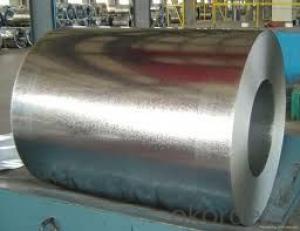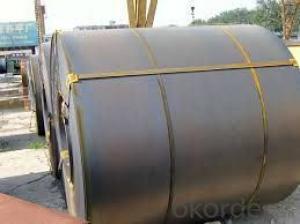Stainless hot Steel Coil/cold steel coil
- Loading Port:
- China main port
- Payment Terms:
- TT OR LC
- Min Order Qty:
- 30 m.t.
- Supply Capability:
- 6000 m.t./month
OKorder Service Pledge
OKorder Financial Service
You Might Also Like
Quick Details
| Grade: | 300 Series | Standard: | JIS,AISI,GB | Length: | as customers' requested |
| Thickness: | 0.1-120mm | Width: | 1000-2000mm | Place of Origin: | Shanxi China (Mainland) |
| Brand Name: | CNBM | Model Number: | 309S | Type: | Coil |
| Application: | petroleum refining | Certification: | SGS, ISO | Color: | natural color |
| Packing: | Standard export seaworthy packing or according to your requirements | Available Finish: | 2B/BA/8K/No.4/SB/HL | Edge: | slit edge and mill edge |
| Features: | accurate dimensions | Manufacture technology: | cold drawn,pickling, hot rolled and cold rolled | Quality: | high quality 201, 304,316,304L,316L,309,410,430 Stainless Steel Coil |
| Stock: | Always in stock | Item: | 201, 202,301, 304,316,304L,316L,309,410,430 Stainless Steel Coil |
Packaging & Delivery
| Packaging Detail: | Standard export packing or as customer's requirement ASTM 309S Stainless Steel Coil |
| Delivery Detail: | In 15 days |
Specifications
201, 202,301, 304,316,304L,316L,309,410,430 Stainless Steel Coil
Width:1000-2000mm
Thickness: 0.1-120mm
Quality:High quality
Product Description
ASTM 309S Stainless Steel Coil
Thickness:0.1-120mm
Width:1000-2000mm
Length: As required
Typical physical properties for stainless steel coil
Grade | Chemical composition | ||||||
C | Si | Mn | P | S | Ni | Cr | |
% | % | % | % | % | % | % | |
309S | ≤0.08 | ≤1.00 | ≤2.00 | ≤0.04 | ≤0.030 | 12.00-15.00 | 22.00-24.00 |
Item | 201, 202,301, 304,316,304L,316L,309,410,430 Stainless Steel Coil |
Technical | Hot rolled and cold rolled |
Standard | ASTM A240,GB/T3280-2007,JIS4304-2005,ASTM A167,EN10088-2-2005,GB/T3280-2007,EN10095-99,JIS4312,etc |
Material | 201, 202,301, 304,316,304L,316L,309,410,430 |
Surface | NO.1,2B, mirror finish,4K,8K,Hairline finish |
Thickness | 0.1-120mm |
Width | 1000-2000mm |
Price term | FOB,CFR,CIF,CNF |
Application | Stainless steel coil applies to construction field, ships building industry, petroleum, chemical industries, war and electricity industries, food processing and medical industry, boiler heat exchanger, machinery and hardware fields. Stainless steel coil can be made according to the customer’s requirements. |
Contact | If you have any question, please feel free to contact me. |
- Q: What are the common methods of cutting steel coils?
- The common methods of cutting steel coils include shearing, slitting, and laser cutting. Shearing involves using a machine with two blades to cut through the coil. Slitting involves passing the coil through a set of rotating circular blades to create narrower strips. Laser cutting uses a high-powered laser beam to cut through the steel coil with precision.
- Q: How are steel coils used in the manufacturing of industrial machinery?
- Steel coils are used in the manufacturing of industrial machinery as raw material for various components, such as frames, brackets, and supports. The coils are processed by cutting, bending, and shaping to create specific parts that provide stability, strength, and structure to the machinery. Additionally, steel coils are often used for creating gears, shafts, and other moving parts that require high durability and resistance to wear and tear.
- Q: How are steel coils used in the production of construction equipment?
- Steel coils are used in the production of construction equipment as they provide a reliable and cost-effective material for manufacturing various components. These coils are often processed and shaped into specific parts, such as frames, chassis, and heavy-duty structures, which make up the foundation and framework of construction equipment. The high strength and durability of steel coils ensure that the equipment can withstand heavy loads, extreme conditions, and repetitive use, making them essential in the construction industry.
- Q: hey i was looking to buy a khukuri machete by cas iberia. its made of carbon steel but doesnt say which one. anyone that is into knives and all that know how this would hold up and the rust resistance of it? mostly be used for cutting bush and small trees
- There's no way to tell from the information you posted. Given it's for a machete I would guess it would be a fairly high carbon steel. Rust resistance will be relatively poor. It will last for years though as long as you clean and dry it after use.
- Q: How are steel coils inspected for defects?
- Steel coils are inspected for defects using various methods to ensure that the quality of the product meets the required standards. One common method is visual inspection, where trained inspectors examine the surface of the coils for any visible defects such as cracks, scratches, or dents. This is usually done by visual observation or with the assistance of magnifying tools. Another method is magnetic particle inspection, which is used to detect surface and near-surface defects such as cracks or voids. In this process, a magnetic field is applied to the steel coil, and a magnetic powder is applied to the surface. If there are any defects, the magnetic powder will be attracted to them, making them visible to the inspector. Ultrasonic testing is also commonly used to inspect steel coils for defects. In this method, high-frequency sound waves are transmitted into the coil, and the reflected waves are analyzed. Any deviations in the sound waves can indicate the presence of defects such as cracks or voids within the coil. Additionally, eddy current testing is employed to detect defects in steel coils. This method uses electromagnetic induction to generate eddy currents within the coil. Any changes in these currents caused by defects in the material are detected and analyzed by the inspector. Lastly, some steel coils may undergo destructive testing, where a sample is taken from the coil and subjected to various tests such as tension or bend testing. These tests are performed to evaluate the mechanical properties of the steel, which can indirectly indicate the presence of defects. Overall, steel coils are inspected for defects through a combination of visual inspection, magnetic particle inspection, ultrasonic testing, eddy current testing, and potentially destructive testing. These methods ensure that any defects are identified and addressed, ensuring that only high-quality steel coils are delivered to customers.
- Q: Help please.What atoms are there in steel?Like water is equals to 1 Oxygen atom + 2 Hydrogen atoms.Thnx 4 d help.
- Steel is mostly iron with a small amount (less than 1%) of carbon added. Stainless steel has other metals like chromium and nickel added.
- Q: How do steel coils contribute to the manufacturing of HVAC systems?
- Steel coils play a crucial role in the manufacturing of HVAC systems. These coils are typically made from high-quality steel, which offers exceptional strength, durability, and heat resistance. One of the main uses of steel coils in HVAC systems is for heat exchangers. Heat exchangers are vital components that facilitate the transfer of heat between two different mediums, usually air and a refrigerant. In an HVAC system, steel coils are used in both the evaporator and condenser coils. The evaporator coil absorbs heat from the air inside a building, while the condenser coil releases heat to the outside environment. These coils are designed with numerous tubes that are coiled and connected with fins. The steel construction of these coils ensures that they can withstand high-pressure environments and resist corrosion, ensuring long-term reliability and efficiency of the HVAC system. Steel coils also contribute to the overall structural integrity of HVAC systems. They are commonly used in the fabrication of ductwork, which is responsible for distributing conditioned air throughout a building. The strength and rigidity of steel coils allow ductwork to maintain its shape and structural integrity under various conditions, including high air pressure and temperature fluctuations. Furthermore, steel coils are often used in the fabrication of HVAC system cabinets and enclosures. These cabinets house various components of the system, such as compressors, fans, and control panels. The robustness of steel coils ensures that the cabinets can withstand external forces, protect the internal components, and provide a secure housing for the entire HVAC system. In summary, steel coils are essential components in the manufacturing of HVAC systems. Their strength, durability, and heat resistance make them ideal for heat exchangers, ductwork, cabinets, and enclosures. By utilizing steel coils, HVAC manufacturers can produce systems that efficiently and effectively regulate temperature, improve indoor air quality, and provide comfort in various residential, commercial, and industrial settings.
- Q: What industries use steel coils?
- Various industries use steel coils, including automotive, construction, appliance manufacturing, transportation, packaging, and energy sectors.
- Q: How do steel coils perform in high-temperature applications?
- Steel coils perform well in high-temperature applications due to their excellent heat resistance and structural stability. The high melting point of steel allows it to maintain its strength and shape even at elevated temperatures, making it suitable for various industries such as automotive, construction, and manufacturing. Additionally, steel coils can withstand thermal expansion and contraction without warping or deforming, ensuring reliable performance and durability in extreme heat conditions.
- Q: Can steel coils be coated with magnetic materials?
- Yes, steel coils can be coated with magnetic materials. The coating process typically involves applying a thin layer of magnetic material, such as nickel or zinc, to the surface of the steel coils. This coating enhances the magnetic properties of the steel, making it more suitable for specific applications that require magnetism.
Send your message to us
Stainless hot Steel Coil/cold steel coil
- Loading Port:
- China main port
- Payment Terms:
- TT OR LC
- Min Order Qty:
- 30 m.t.
- Supply Capability:
- 6000 m.t./month
OKorder Service Pledge
OKorder Financial Service
Similar products
Hot products
Hot Searches
Related keywords
